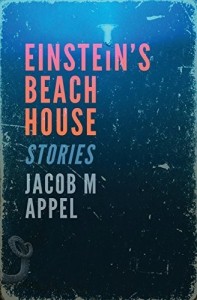188 pages, $15.95
Review by Lynne Weiss
The theme of the highly readable and surprising stories that comprise Jacob M. Appel’s Einstein’s Beach House is aptly expressed in the first sentence of the first story, “Hue and Cry”—these stories describe things that are “funny” when they happen “to other people.” Things, the narrator goes on to explain, like “tarring and feathering, Peeping Toms, mad cow disease.” In a sense, all three of these things happen to characters in this first story, which describes the plans of a man dying of a brain-wasting disease to teach his daughters forgiveness by taking them to meet a paroled Level 1 sex offender who has recently moved into their neighborhood. The protagonist is 13-year-old Lizzie, one of the aforementioned daughters of the dying man. While everyone else in the neighborhood is protesting the presence of the parolee (metaphorically tarring and feathering him), Lizzie’s father is making plans to befriend him, and Lizzie and her friend Julia are the Peeping Toms who put a watch on the sex offender’s house and break into it to look for something unspecified. “We’ll know it when we find it,” Julia assures Lizzie, and Lizzie does find something in the course of the story, but it has nothing to do with the sex offender and much to do with her coming to terms with her father’s death and declining powers.
Appel is an award-winning writer whose work has appeared in more than 200 literary journals. According to his website, Appel is has an M.D. from Columbia and has been admitted to the bar in New York State and Rhode Island. Einstein’s Beach House, which is published by Pressgang, a small press affiliated with the Butler University MFA program, is Appel’s second collection of short stories. He has also published novels and collections of essays.
Nearly every one of the stories in this collection is built around a situation that seems bizarrely humorous at the outset, but ultimately revelatory and moving. Like “Hue and Cry,” the title story, “Einstein’s Beach House” and “The Rod of Asclepius” are stories about childhood events told from the perspective of adulthood. In the title story, a typo in a guidebook incorrectly identifies the dilapidated home of an 11-year-old girl and her family as Einstein’s former summer residence. What follows is initially humorous but ultimately sad, as the error brings financial ruin and marital discord. “The Rod of Asclepius” is a chilling recollection by the daughter of a man she eventually realized was a serial killer driven by love.
Some of the stories are about couples who use desperate means to maintain a relationship. “La Tristesse des Hérissons” describes the efforts of a couple brought together by the shared experience of parental suicide to keep a pet hedgehog happy; “Sharing the Hostage” revolves around a ventriloquist’s attempts to support his new girlfriend in her custody battle for a pet tortoise. The juxtaposition of elements such as suicide and hedgehogs, ventriloquist and custody battles should give you a sense of Appel’s ability to illuminate tragedy with farce.
A third group of stories involves adults who gain insight through a confrontation between the imagined with the real. In “Strings,” a rabbi grows closer to her husband after she allows an ex-lover who paints an “image on the air” to stage a disastrous concert of 400 cellos in the sanctuary of her temple. In “Limerance,” a successful judge agrees, at the urging of his wife, to meet with the woman who was once the object of his high school fantasies. The final story, “Paracosmos,” is one of the most intriguing. The mother of a young girl has an affair—real or imaginary—with the father of her daughter’s imaginary friend and then leaves her husband because she suspects him of having an affair with the imaginary friend’s mother after he makes a remark that he claims is just a joke. “What part of make-believe don’t you understand?” he asks her. Like the characters in this final story, you’ll start reading the stories in Einstein’s Beach House for the jokes, but find yourself drawn in and ultimately sobered by the punchlines.
***
Lynne Weiss’s work has appeared in Circa: A Journal of Historical Fiction; Black Warrior Review; and Brain, Child; as well as the blogs of The Common, Ploughshares, and PANK. She has received grants and residency awards from the Massachusetts Cultural Council, the Millay Colony, the Vermont Studio Center, and Yaddo.
![[PANK]](https://pankmagazine.com/wp-content/themes/pank/assets/images/pank-logo-large.png)

